Report: Contemporary Hotel and Tourism Issues in Hong Kong
VerifiedAdded on 2022/08/14
|10
|3472
|267
Report
AI Summary
This report provides a comprehensive overview of contemporary hotel and tourism issues in Hong Kong. It begins with an introduction to the tourism sector's economic contribution and highlights the impact of the Individual Visit Scheme. The report then delves into several key areas, including tourist m...
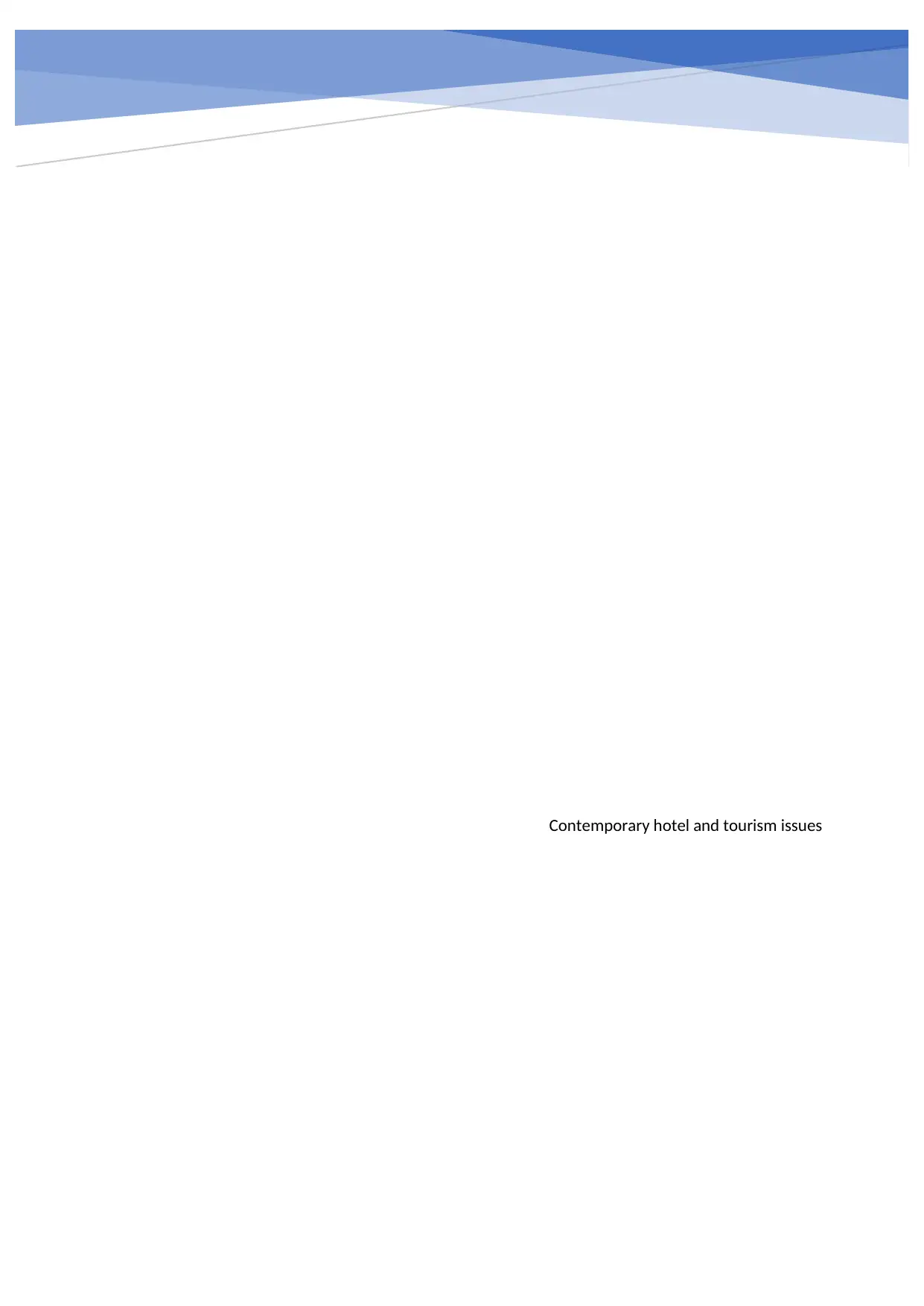
Contemporary hotel and tourism issues
Paraphrase This Document
Need a fresh take? Get an instant paraphrase of this document with our AI Paraphraser
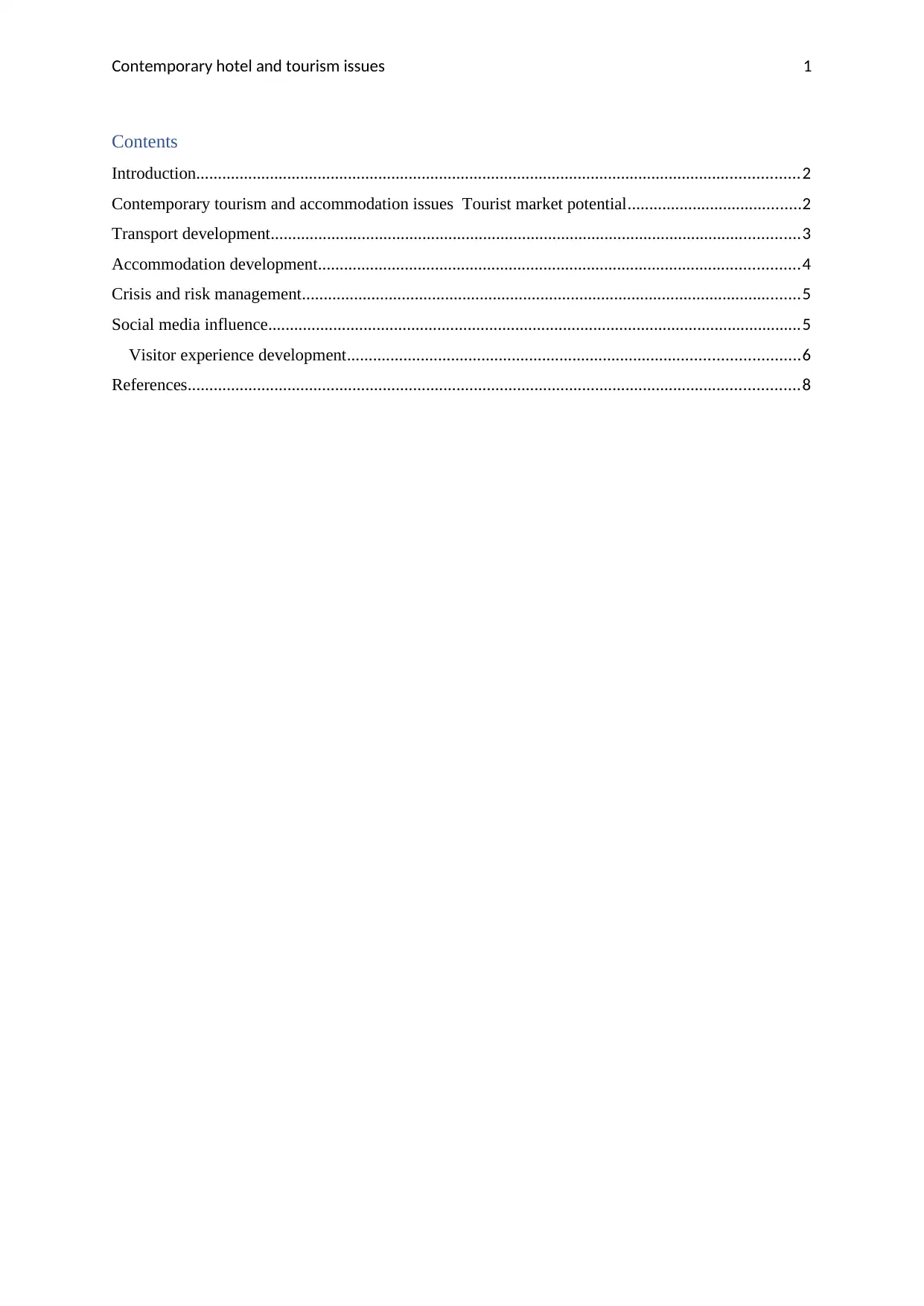
Contemporary hotel and tourism issues 1
Contents
Introduction...........................................................................................................................................2
Contemporary tourism and accommodation issues Tourist market potential........................................2
Transport development..........................................................................................................................3
Accommodation development...............................................................................................................4
Crisis and risk management...................................................................................................................5
Social media influence...........................................................................................................................5
Visitor experience development........................................................................................................6
References.............................................................................................................................................8
Contents
Introduction...........................................................................................................................................2
Contemporary tourism and accommodation issues Tourist market potential........................................2
Transport development..........................................................................................................................3
Accommodation development...............................................................................................................4
Crisis and risk management...................................................................................................................5
Social media influence...........................................................................................................................5
Visitor experience development........................................................................................................6
References.............................................................................................................................................8
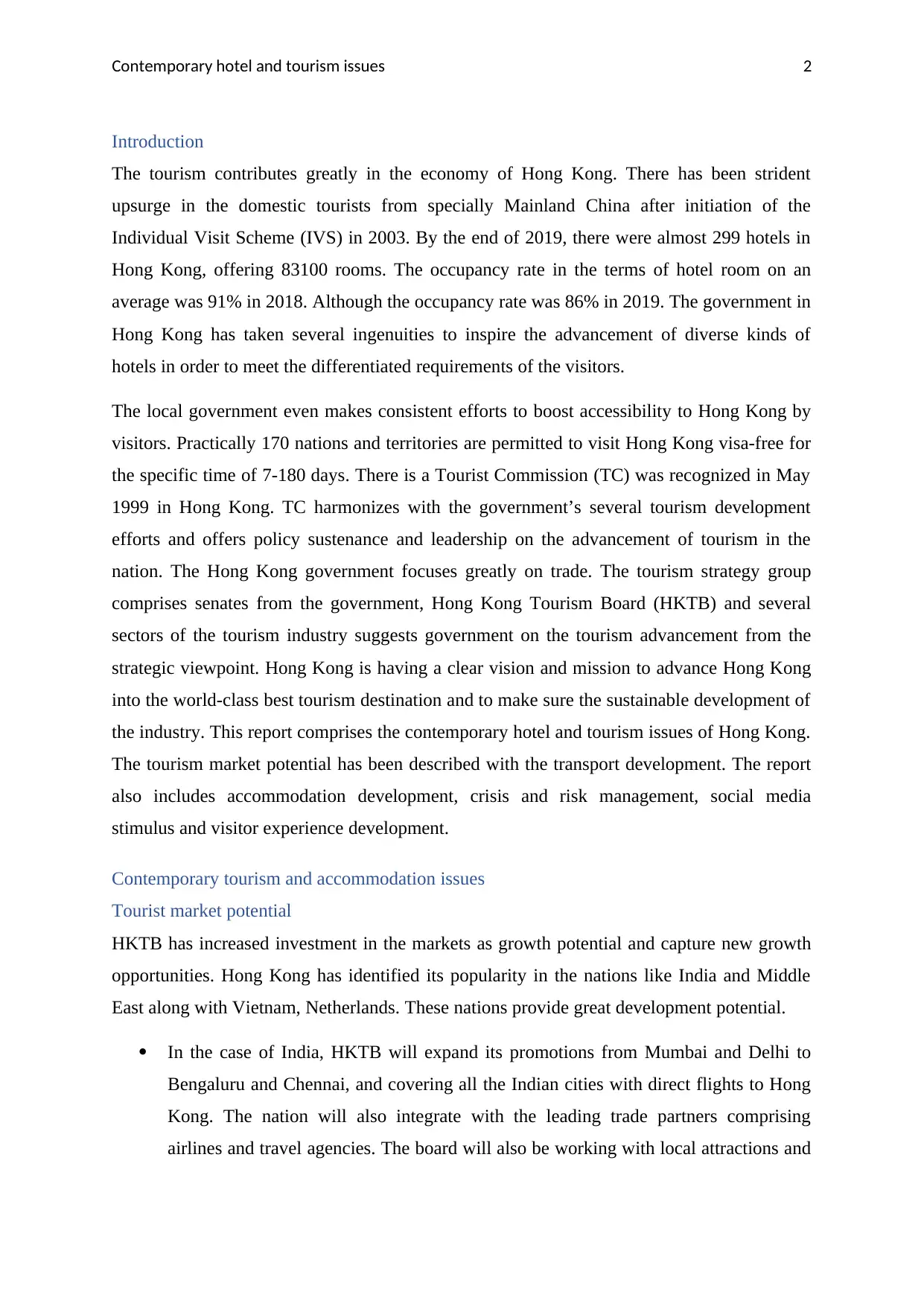
Contemporary hotel and tourism issues 2
Introduction
The tourism contributes greatly in the economy of Hong Kong. There has been strident
upsurge in the domestic tourists from specially Mainland China after initiation of the
Individual Visit Scheme (IVS) in 2003. By the end of 2019, there were almost 299 hotels in
Hong Kong, offering 83100 rooms. The occupancy rate in the terms of hotel room on an
average was 91% in 2018. Although the occupancy rate was 86% in 2019. The government in
Hong Kong has taken several ingenuities to inspire the advancement of diverse kinds of
hotels in order to meet the differentiated requirements of the visitors.
The local government even makes consistent efforts to boost accessibility to Hong Kong by
visitors. Practically 170 nations and territories are permitted to visit Hong Kong visa-free for
the specific time of 7-180 days. There is a Tourist Commission (TC) was recognized in May
1999 in Hong Kong. TC harmonizes with the government’s several tourism development
efforts and offers policy sustenance and leadership on the advancement of tourism in the
nation. The Hong Kong government focuses greatly on trade. The tourism strategy group
comprises senates from the government, Hong Kong Tourism Board (HKTB) and several
sectors of the tourism industry suggests government on the tourism advancement from the
strategic viewpoint. Hong Kong is having a clear vision and mission to advance Hong Kong
into the world-class best tourism destination and to make sure the sustainable development of
the industry. This report comprises the contemporary hotel and tourism issues of Hong Kong.
The tourism market potential has been described with the transport development. The report
also includes accommodation development, crisis and risk management, social media
stimulus and visitor experience development.
Contemporary tourism and accommodation issues
Tourist market potential
HKTB has increased investment in the markets as growth potential and capture new growth
opportunities. Hong Kong has identified its popularity in the nations like India and Middle
East along with Vietnam, Netherlands. These nations provide great development potential.
In the case of India, HKTB will expand its promotions from Mumbai and Delhi to
Bengaluru and Chennai, and covering all the Indian cities with direct flights to Hong
Kong. The nation will also integrate with the leading trade partners comprising
airlines and travel agencies. The board will also be working with local attractions and
Introduction
The tourism contributes greatly in the economy of Hong Kong. There has been strident
upsurge in the domestic tourists from specially Mainland China after initiation of the
Individual Visit Scheme (IVS) in 2003. By the end of 2019, there were almost 299 hotels in
Hong Kong, offering 83100 rooms. The occupancy rate in the terms of hotel room on an
average was 91% in 2018. Although the occupancy rate was 86% in 2019. The government in
Hong Kong has taken several ingenuities to inspire the advancement of diverse kinds of
hotels in order to meet the differentiated requirements of the visitors.
The local government even makes consistent efforts to boost accessibility to Hong Kong by
visitors. Practically 170 nations and territories are permitted to visit Hong Kong visa-free for
the specific time of 7-180 days. There is a Tourist Commission (TC) was recognized in May
1999 in Hong Kong. TC harmonizes with the government’s several tourism development
efforts and offers policy sustenance and leadership on the advancement of tourism in the
nation. The Hong Kong government focuses greatly on trade. The tourism strategy group
comprises senates from the government, Hong Kong Tourism Board (HKTB) and several
sectors of the tourism industry suggests government on the tourism advancement from the
strategic viewpoint. Hong Kong is having a clear vision and mission to advance Hong Kong
into the world-class best tourism destination and to make sure the sustainable development of
the industry. This report comprises the contemporary hotel and tourism issues of Hong Kong.
The tourism market potential has been described with the transport development. The report
also includes accommodation development, crisis and risk management, social media
stimulus and visitor experience development.
Contemporary tourism and accommodation issues
Tourist market potential
HKTB has increased investment in the markets as growth potential and capture new growth
opportunities. Hong Kong has identified its popularity in the nations like India and Middle
East along with Vietnam, Netherlands. These nations provide great development potential.
In the case of India, HKTB will expand its promotions from Mumbai and Delhi to
Bengaluru and Chennai, and covering all the Indian cities with direct flights to Hong
Kong. The nation will also integrate with the leading trade partners comprising
airlines and travel agencies. The board will also be working with local attractions and
⊘ This is a preview!⊘
Do you want full access?
Subscribe today to unlock all pages.

Trusted by 1+ million students worldwide
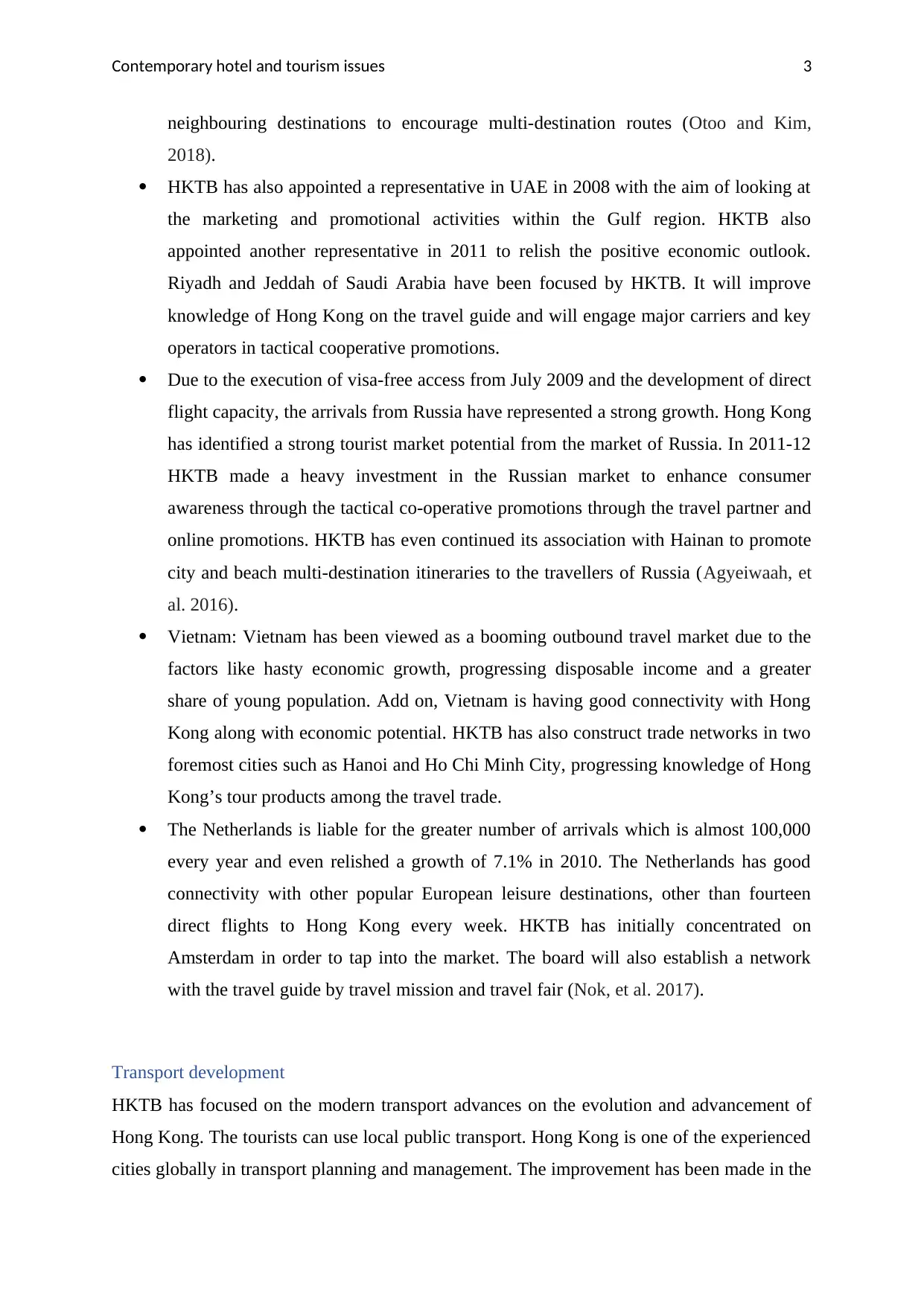
Contemporary hotel and tourism issues 3
neighbouring destinations to encourage multi-destination routes (Otoo and Kim,
2018).
HKTB has also appointed a representative in UAE in 2008 with the aim of looking at
the marketing and promotional activities within the Gulf region. HKTB also
appointed another representative in 2011 to relish the positive economic outlook.
Riyadh and Jeddah of Saudi Arabia have been focused by HKTB. It will improve
knowledge of Hong Kong on the travel guide and will engage major carriers and key
operators in tactical cooperative promotions.
Due to the execution of visa-free access from July 2009 and the development of direct
flight capacity, the arrivals from Russia have represented a strong growth. Hong Kong
has identified a strong tourist market potential from the market of Russia. In 2011-12
HKTB made a heavy investment in the Russian market to enhance consumer
awareness through the tactical co-operative promotions through the travel partner and
online promotions. HKTB has even continued its association with Hainan to promote
city and beach multi-destination itineraries to the travellers of Russia (Agyeiwaah, et
al. 2016).
Vietnam: Vietnam has been viewed as a booming outbound travel market due to the
factors like hasty economic growth, progressing disposable income and a greater
share of young population. Add on, Vietnam is having good connectivity with Hong
Kong along with economic potential. HKTB has also construct trade networks in two
foremost cities such as Hanoi and Ho Chi Minh City, progressing knowledge of Hong
Kong’s tour products among the travel trade.
The Netherlands is liable for the greater number of arrivals which is almost 100,000
every year and even relished a growth of 7.1% in 2010. The Netherlands has good
connectivity with other popular European leisure destinations, other than fourteen
direct flights to Hong Kong every week. HKTB has initially concentrated on
Amsterdam in order to tap into the market. The board will also establish a network
with the travel guide by travel mission and travel fair (Nok, et al. 2017).
Transport development
HKTB has focused on the modern transport advances on the evolution and advancement of
Hong Kong. The tourists can use local public transport. Hong Kong is one of the experienced
cities globally in transport planning and management. The improvement has been made in the
neighbouring destinations to encourage multi-destination routes (Otoo and Kim,
2018).
HKTB has also appointed a representative in UAE in 2008 with the aim of looking at
the marketing and promotional activities within the Gulf region. HKTB also
appointed another representative in 2011 to relish the positive economic outlook.
Riyadh and Jeddah of Saudi Arabia have been focused by HKTB. It will improve
knowledge of Hong Kong on the travel guide and will engage major carriers and key
operators in tactical cooperative promotions.
Due to the execution of visa-free access from July 2009 and the development of direct
flight capacity, the arrivals from Russia have represented a strong growth. Hong Kong
has identified a strong tourist market potential from the market of Russia. In 2011-12
HKTB made a heavy investment in the Russian market to enhance consumer
awareness through the tactical co-operative promotions through the travel partner and
online promotions. HKTB has even continued its association with Hainan to promote
city and beach multi-destination itineraries to the travellers of Russia (Agyeiwaah, et
al. 2016).
Vietnam: Vietnam has been viewed as a booming outbound travel market due to the
factors like hasty economic growth, progressing disposable income and a greater
share of young population. Add on, Vietnam is having good connectivity with Hong
Kong along with economic potential. HKTB has also construct trade networks in two
foremost cities such as Hanoi and Ho Chi Minh City, progressing knowledge of Hong
Kong’s tour products among the travel trade.
The Netherlands is liable for the greater number of arrivals which is almost 100,000
every year and even relished a growth of 7.1% in 2010. The Netherlands has good
connectivity with other popular European leisure destinations, other than fourteen
direct flights to Hong Kong every week. HKTB has initially concentrated on
Amsterdam in order to tap into the market. The board will also establish a network
with the travel guide by travel mission and travel fair (Nok, et al. 2017).
Transport development
HKTB has focused on the modern transport advances on the evolution and advancement of
Hong Kong. The tourists can use local public transport. Hong Kong is one of the experienced
cities globally in transport planning and management. The improvement has been made in the
Paraphrase This Document
Need a fresh take? Get an instant paraphrase of this document with our AI Paraphraser
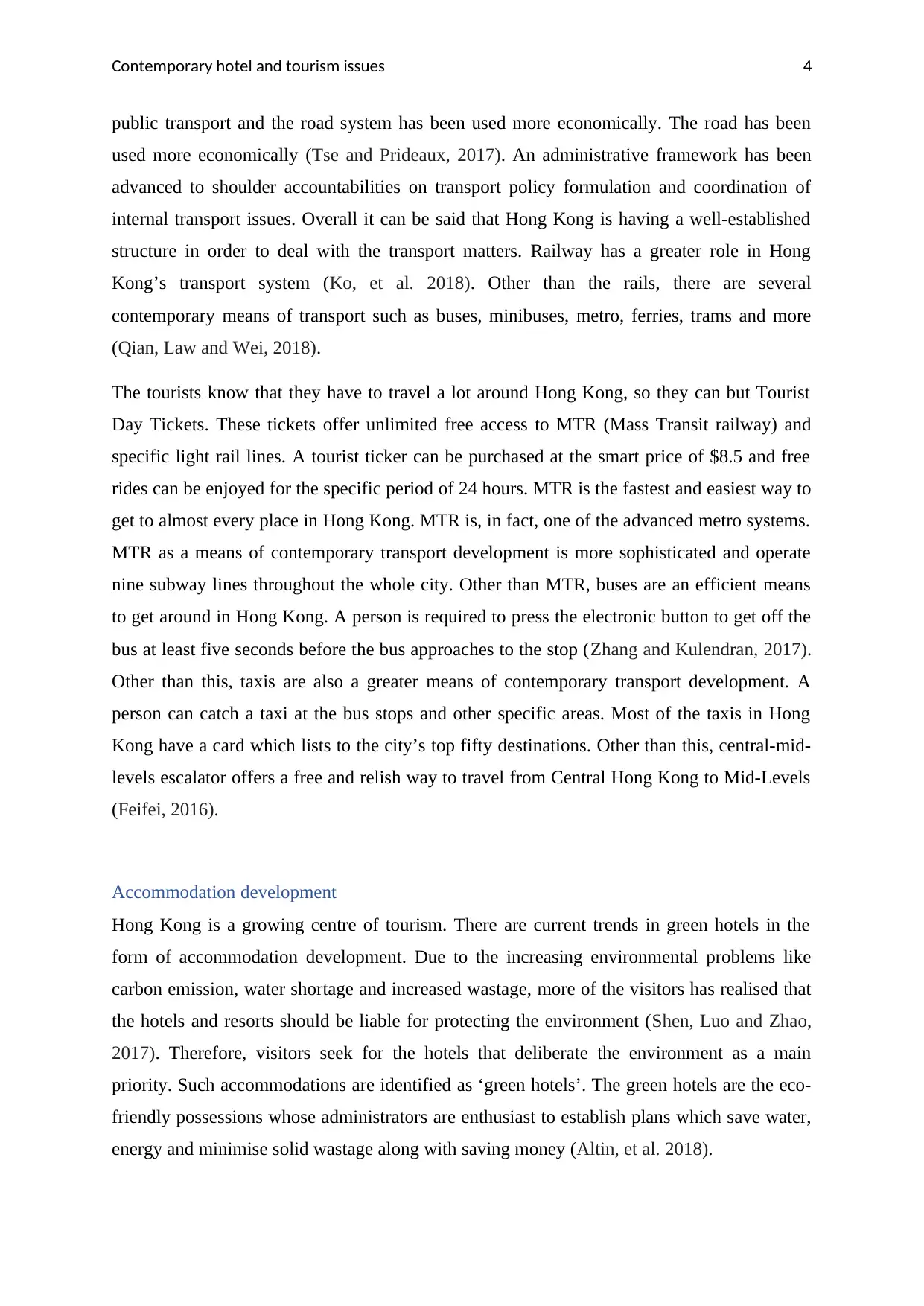
Contemporary hotel and tourism issues 4
public transport and the road system has been used more economically. The road has been
used more economically (Tse and Prideaux, 2017). An administrative framework has been
advanced to shoulder accountabilities on transport policy formulation and coordination of
internal transport issues. Overall it can be said that Hong Kong is having a well-established
structure in order to deal with the transport matters. Railway has a greater role in Hong
Kong’s transport system (Ko, et al. 2018). Other than the rails, there are several
contemporary means of transport such as buses, minibuses, metro, ferries, trams and more
(Qian, Law and Wei, 2018).
The tourists know that they have to travel a lot around Hong Kong, so they can but Tourist
Day Tickets. These tickets offer unlimited free access to MTR (Mass Transit railway) and
specific light rail lines. A tourist ticker can be purchased at the smart price of $8.5 and free
rides can be enjoyed for the specific period of 24 hours. MTR is the fastest and easiest way to
get to almost every place in Hong Kong. MTR is, in fact, one of the advanced metro systems.
MTR as a means of contemporary transport development is more sophisticated and operate
nine subway lines throughout the whole city. Other than MTR, buses are an efficient means
to get around in Hong Kong. A person is required to press the electronic button to get off the
bus at least five seconds before the bus approaches to the stop (Zhang and Kulendran, 2017).
Other than this, taxis are also a greater means of contemporary transport development. A
person can catch a taxi at the bus stops and other specific areas. Most of the taxis in Hong
Kong have a card which lists to the city’s top fifty destinations. Other than this, central-mid-
levels escalator offers a free and relish way to travel from Central Hong Kong to Mid-Levels
(Feifei, 2016).
Accommodation development
Hong Kong is a growing centre of tourism. There are current trends in green hotels in the
form of accommodation development. Due to the increasing environmental problems like
carbon emission, water shortage and increased wastage, more of the visitors has realised that
the hotels and resorts should be liable for protecting the environment (Shen, Luo and Zhao,
2017). Therefore, visitors seek for the hotels that deliberate the environment as a main
priority. Such accommodations are identified as ‘green hotels’. The green hotels are the eco-
friendly possessions whose administrators are enthusiast to establish plans which save water,
energy and minimise solid wastage along with saving money (Altin, et al. 2018).
public transport and the road system has been used more economically. The road has been
used more economically (Tse and Prideaux, 2017). An administrative framework has been
advanced to shoulder accountabilities on transport policy formulation and coordination of
internal transport issues. Overall it can be said that Hong Kong is having a well-established
structure in order to deal with the transport matters. Railway has a greater role in Hong
Kong’s transport system (Ko, et al. 2018). Other than the rails, there are several
contemporary means of transport such as buses, minibuses, metro, ferries, trams and more
(Qian, Law and Wei, 2018).
The tourists know that they have to travel a lot around Hong Kong, so they can but Tourist
Day Tickets. These tickets offer unlimited free access to MTR (Mass Transit railway) and
specific light rail lines. A tourist ticker can be purchased at the smart price of $8.5 and free
rides can be enjoyed for the specific period of 24 hours. MTR is the fastest and easiest way to
get to almost every place in Hong Kong. MTR is, in fact, one of the advanced metro systems.
MTR as a means of contemporary transport development is more sophisticated and operate
nine subway lines throughout the whole city. Other than MTR, buses are an efficient means
to get around in Hong Kong. A person is required to press the electronic button to get off the
bus at least five seconds before the bus approaches to the stop (Zhang and Kulendran, 2017).
Other than this, taxis are also a greater means of contemporary transport development. A
person can catch a taxi at the bus stops and other specific areas. Most of the taxis in Hong
Kong have a card which lists to the city’s top fifty destinations. Other than this, central-mid-
levels escalator offers a free and relish way to travel from Central Hong Kong to Mid-Levels
(Feifei, 2016).
Accommodation development
Hong Kong is a growing centre of tourism. There are current trends in green hotels in the
form of accommodation development. Due to the increasing environmental problems like
carbon emission, water shortage and increased wastage, more of the visitors has realised that
the hotels and resorts should be liable for protecting the environment (Shen, Luo and Zhao,
2017). Therefore, visitors seek for the hotels that deliberate the environment as a main
priority. Such accommodations are identified as ‘green hotels’. The green hotels are the eco-
friendly possessions whose administrators are enthusiast to establish plans which save water,
energy and minimise solid wastage along with saving money (Altin, et al. 2018).
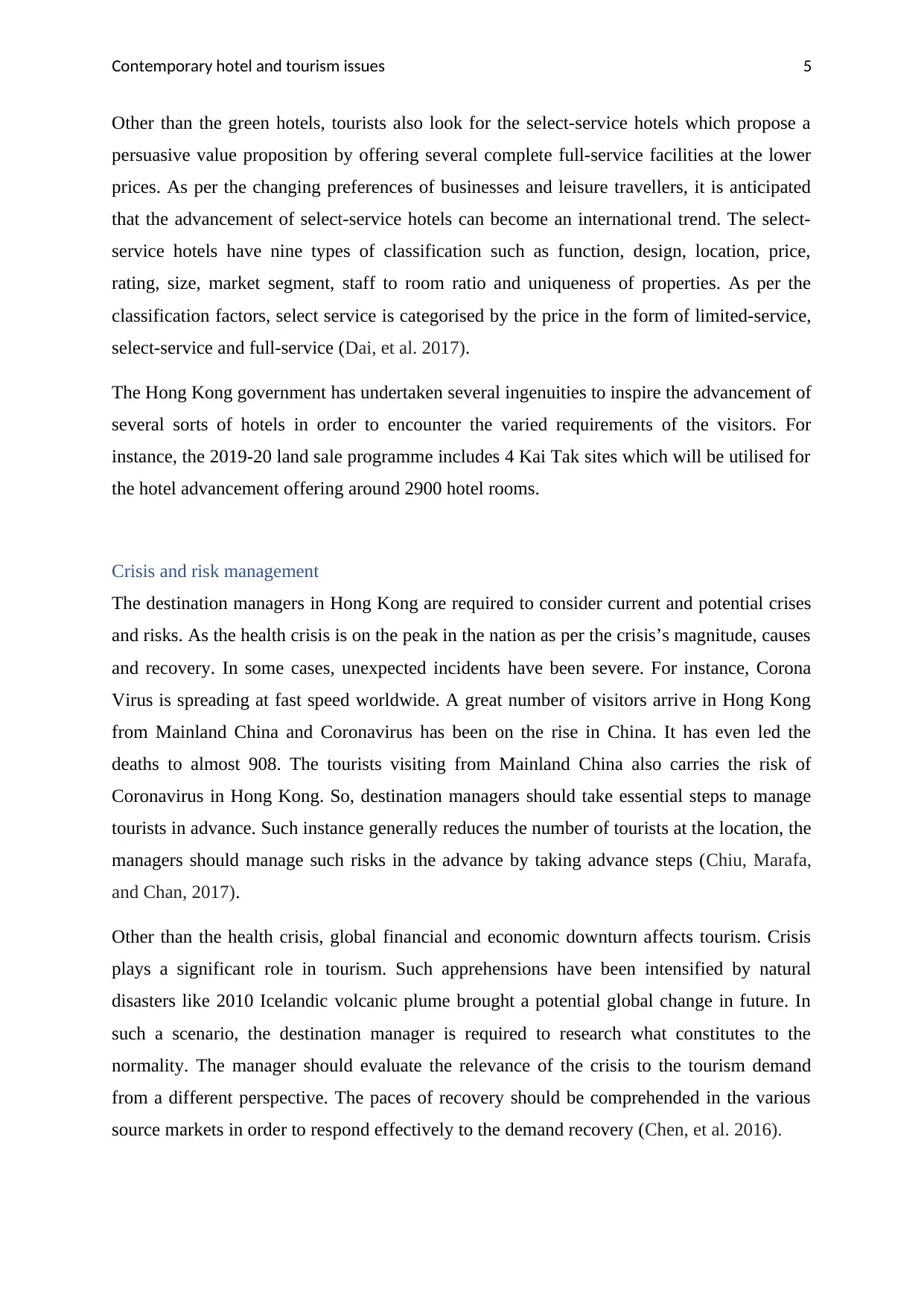
Contemporary hotel and tourism issues 5
Other than the green hotels, tourists also look for the select-service hotels which propose a
persuasive value proposition by offering several complete full-service facilities at the lower
prices. As per the changing preferences of businesses and leisure travellers, it is anticipated
that the advancement of select-service hotels can become an international trend. The select-
service hotels have nine types of classification such as function, design, location, price,
rating, size, market segment, staff to room ratio and uniqueness of properties. As per the
classification factors, select service is categorised by the price in the form of limited-service,
select-service and full-service (Dai, et al. 2017).
The Hong Kong government has undertaken several ingenuities to inspire the advancement of
several sorts of hotels in order to encounter the varied requirements of the visitors. For
instance, the 2019-20 land sale programme includes 4 Kai Tak sites which will be utilised for
the hotel advancement offering around 2900 hotel rooms.
Crisis and risk management
The destination managers in Hong Kong are required to consider current and potential crises
and risks. As the health crisis is on the peak in the nation as per the crisis’s magnitude, causes
and recovery. In some cases, unexpected incidents have been severe. For instance, Corona
Virus is spreading at fast speed worldwide. A great number of visitors arrive in Hong Kong
from Mainland China and Coronavirus has been on the rise in China. It has even led the
deaths to almost 908. The tourists visiting from Mainland China also carries the risk of
Coronavirus in Hong Kong. So, destination managers should take essential steps to manage
tourists in advance. Such instance generally reduces the number of tourists at the location, the
managers should manage such risks in the advance by taking advance steps (Chiu, Marafa,
and Chan, 2017).
Other than the health crisis, global financial and economic downturn affects tourism. Crisis
plays a significant role in tourism. Such apprehensions have been intensified by natural
disasters like 2010 Icelandic volcanic plume brought a potential global change in future. In
such a scenario, the destination manager is required to research what constitutes to the
normality. The manager should evaluate the relevance of the crisis to the tourism demand
from a different perspective. The paces of recovery should be comprehended in the various
source markets in order to respond effectively to the demand recovery (Chen, et al. 2016).
Other than the green hotels, tourists also look for the select-service hotels which propose a
persuasive value proposition by offering several complete full-service facilities at the lower
prices. As per the changing preferences of businesses and leisure travellers, it is anticipated
that the advancement of select-service hotels can become an international trend. The select-
service hotels have nine types of classification such as function, design, location, price,
rating, size, market segment, staff to room ratio and uniqueness of properties. As per the
classification factors, select service is categorised by the price in the form of limited-service,
select-service and full-service (Dai, et al. 2017).
The Hong Kong government has undertaken several ingenuities to inspire the advancement of
several sorts of hotels in order to encounter the varied requirements of the visitors. For
instance, the 2019-20 land sale programme includes 4 Kai Tak sites which will be utilised for
the hotel advancement offering around 2900 hotel rooms.
Crisis and risk management
The destination managers in Hong Kong are required to consider current and potential crises
and risks. As the health crisis is on the peak in the nation as per the crisis’s magnitude, causes
and recovery. In some cases, unexpected incidents have been severe. For instance, Corona
Virus is spreading at fast speed worldwide. A great number of visitors arrive in Hong Kong
from Mainland China and Coronavirus has been on the rise in China. It has even led the
deaths to almost 908. The tourists visiting from Mainland China also carries the risk of
Coronavirus in Hong Kong. So, destination managers should take essential steps to manage
tourists in advance. Such instance generally reduces the number of tourists at the location, the
managers should manage such risks in the advance by taking advance steps (Chiu, Marafa,
and Chan, 2017).
Other than the health crisis, global financial and economic downturn affects tourism. Crisis
plays a significant role in tourism. Such apprehensions have been intensified by natural
disasters like 2010 Icelandic volcanic plume brought a potential global change in future. In
such a scenario, the destination manager is required to research what constitutes to the
normality. The manager should evaluate the relevance of the crisis to the tourism demand
from a different perspective. The paces of recovery should be comprehended in the various
source markets in order to respond effectively to the demand recovery (Chen, et al. 2016).
⊘ This is a preview!⊘
Do you want full access?
Subscribe today to unlock all pages.

Trusted by 1+ million students worldwide
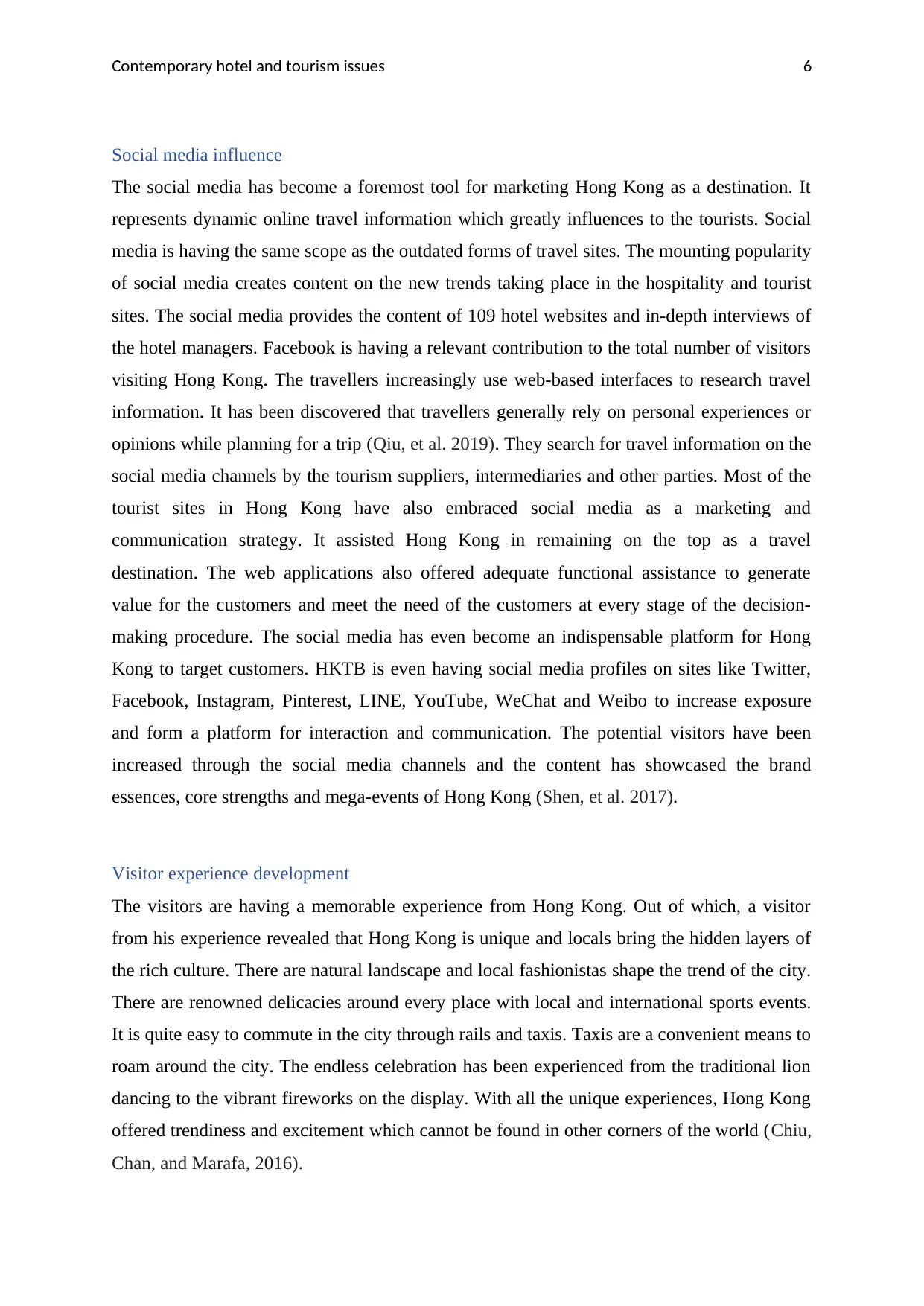
Contemporary hotel and tourism issues 6
Social media influence
The social media has become a foremost tool for marketing Hong Kong as a destination. It
represents dynamic online travel information which greatly influences to the tourists. Social
media is having the same scope as the outdated forms of travel sites. The mounting popularity
of social media creates content on the new trends taking place in the hospitality and tourist
sites. The social media provides the content of 109 hotel websites and in-depth interviews of
the hotel managers. Facebook is having a relevant contribution to the total number of visitors
visiting Hong Kong. The travellers increasingly use web-based interfaces to research travel
information. It has been discovered that travellers generally rely on personal experiences or
opinions while planning for a trip (Qiu, et al. 2019). They search for travel information on the
social media channels by the tourism suppliers, intermediaries and other parties. Most of the
tourist sites in Hong Kong have also embraced social media as a marketing and
communication strategy. It assisted Hong Kong in remaining on the top as a travel
destination. The web applications also offered adequate functional assistance to generate
value for the customers and meet the need of the customers at every stage of the decision-
making procedure. The social media has even become an indispensable platform for Hong
Kong to target customers. HKTB is even having social media profiles on sites like Twitter,
Facebook, Instagram, Pinterest, LINE, YouTube, WeChat and Weibo to increase exposure
and form a platform for interaction and communication. The potential visitors have been
increased through the social media channels and the content has showcased the brand
essences, core strengths and mega-events of Hong Kong (Shen, et al. 2017).
Visitor experience development
The visitors are having a memorable experience from Hong Kong. Out of which, a visitor
from his experience revealed that Hong Kong is unique and locals bring the hidden layers of
the rich culture. There are natural landscape and local fashionistas shape the trend of the city.
There are renowned delicacies around every place with local and international sports events.
It is quite easy to commute in the city through rails and taxis. Taxis are a convenient means to
roam around the city. The endless celebration has been experienced from the traditional lion
dancing to the vibrant fireworks on the display. With all the unique experiences, Hong Kong
offered trendiness and excitement which cannot be found in other corners of the world (Chiu,
Chan, and Marafa, 2016).
Social media influence
The social media has become a foremost tool for marketing Hong Kong as a destination. It
represents dynamic online travel information which greatly influences to the tourists. Social
media is having the same scope as the outdated forms of travel sites. The mounting popularity
of social media creates content on the new trends taking place in the hospitality and tourist
sites. The social media provides the content of 109 hotel websites and in-depth interviews of
the hotel managers. Facebook is having a relevant contribution to the total number of visitors
visiting Hong Kong. The travellers increasingly use web-based interfaces to research travel
information. It has been discovered that travellers generally rely on personal experiences or
opinions while planning for a trip (Qiu, et al. 2019). They search for travel information on the
social media channels by the tourism suppliers, intermediaries and other parties. Most of the
tourist sites in Hong Kong have also embraced social media as a marketing and
communication strategy. It assisted Hong Kong in remaining on the top as a travel
destination. The web applications also offered adequate functional assistance to generate
value for the customers and meet the need of the customers at every stage of the decision-
making procedure. The social media has even become an indispensable platform for Hong
Kong to target customers. HKTB is even having social media profiles on sites like Twitter,
Facebook, Instagram, Pinterest, LINE, YouTube, WeChat and Weibo to increase exposure
and form a platform for interaction and communication. The potential visitors have been
increased through the social media channels and the content has showcased the brand
essences, core strengths and mega-events of Hong Kong (Shen, et al. 2017).
Visitor experience development
The visitors are having a memorable experience from Hong Kong. Out of which, a visitor
from his experience revealed that Hong Kong is unique and locals bring the hidden layers of
the rich culture. There are natural landscape and local fashionistas shape the trend of the city.
There are renowned delicacies around every place with local and international sports events.
It is quite easy to commute in the city through rails and taxis. Taxis are a convenient means to
roam around the city. The endless celebration has been experienced from the traditional lion
dancing to the vibrant fireworks on the display. With all the unique experiences, Hong Kong
offered trendiness and excitement which cannot be found in other corners of the world (Chiu,
Chan, and Marafa, 2016).
Paraphrase This Document
Need a fresh take? Get an instant paraphrase of this document with our AI Paraphraser
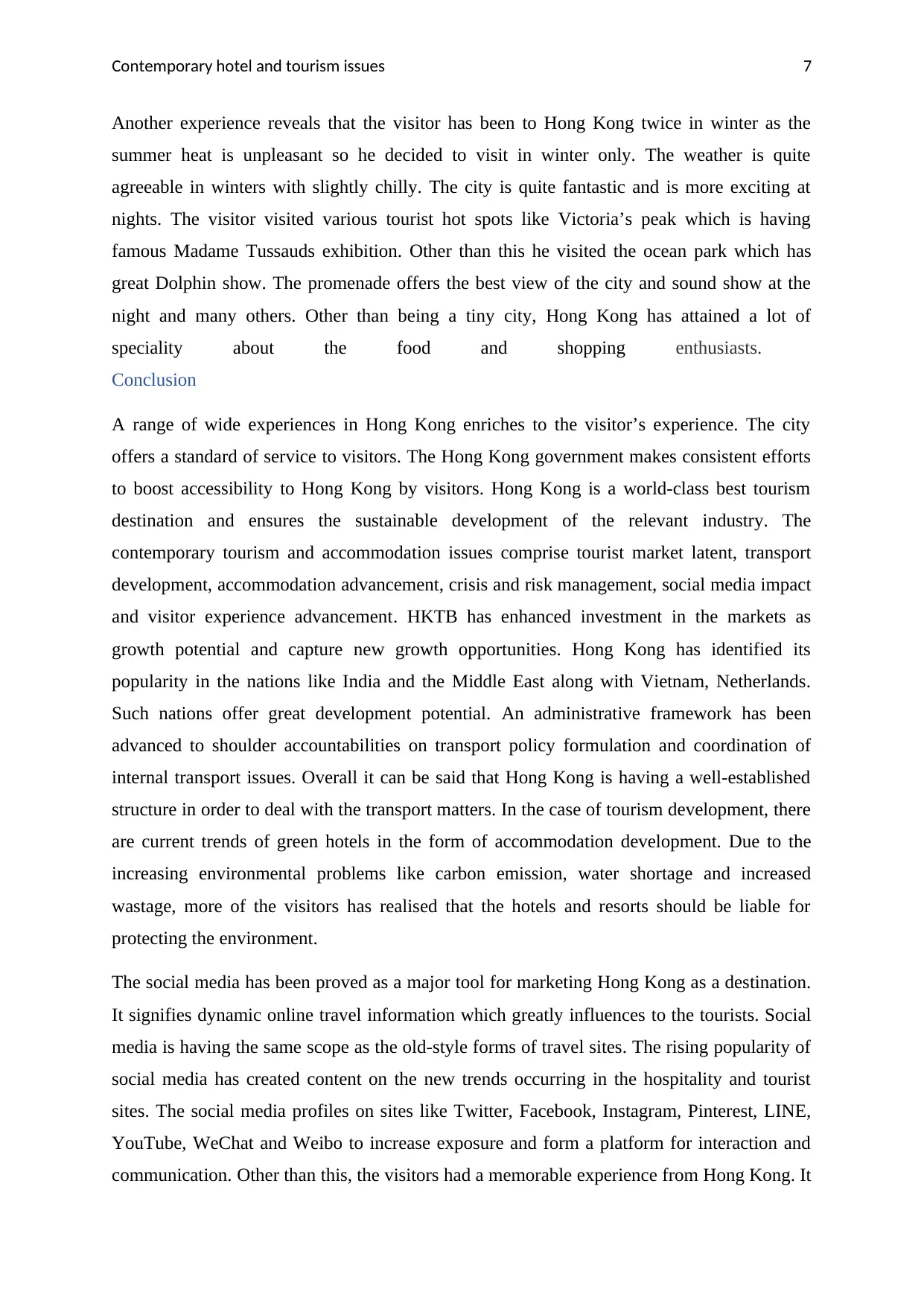
Contemporary hotel and tourism issues 7
Another experience reveals that the visitor has been to Hong Kong twice in winter as the
summer heat is unpleasant so he decided to visit in winter only. The weather is quite
agreeable in winters with slightly chilly. The city is quite fantastic and is more exciting at
nights. The visitor visited various tourist hot spots like Victoria’s peak which is having
famous Madame Tussauds exhibition. Other than this he visited the ocean park which has
great Dolphin show. The promenade offers the best view of the city and sound show at the
night and many others. Other than being a tiny city, Hong Kong has attained a lot of
speciality about the food and shopping enthusiasts.
Conclusion
A range of wide experiences in Hong Kong enriches to the visitor’s experience. The city
offers a standard of service to visitors. The Hong Kong government makes consistent efforts
to boost accessibility to Hong Kong by visitors. Hong Kong is a world-class best tourism
destination and ensures the sustainable development of the relevant industry. The
contemporary tourism and accommodation issues comprise tourist market latent, transport
development, accommodation advancement, crisis and risk management, social media impact
and visitor experience advancement. HKTB has enhanced investment in the markets as
growth potential and capture new growth opportunities. Hong Kong has identified its
popularity in the nations like India and the Middle East along with Vietnam, Netherlands.
Such nations offer great development potential. An administrative framework has been
advanced to shoulder accountabilities on transport policy formulation and coordination of
internal transport issues. Overall it can be said that Hong Kong is having a well-established
structure in order to deal with the transport matters. In the case of tourism development, there
are current trends of green hotels in the form of accommodation development. Due to the
increasing environmental problems like carbon emission, water shortage and increased
wastage, more of the visitors has realised that the hotels and resorts should be liable for
protecting the environment.
The social media has been proved as a major tool for marketing Hong Kong as a destination.
It signifies dynamic online travel information which greatly influences to the tourists. Social
media is having the same scope as the old-style forms of travel sites. The rising popularity of
social media has created content on the new trends occurring in the hospitality and tourist
sites. The social media profiles on sites like Twitter, Facebook, Instagram, Pinterest, LINE,
YouTube, WeChat and Weibo to increase exposure and form a platform for interaction and
communication. Other than this, the visitors had a memorable experience from Hong Kong. It
Another experience reveals that the visitor has been to Hong Kong twice in winter as the
summer heat is unpleasant so he decided to visit in winter only. The weather is quite
agreeable in winters with slightly chilly. The city is quite fantastic and is more exciting at
nights. The visitor visited various tourist hot spots like Victoria’s peak which is having
famous Madame Tussauds exhibition. Other than this he visited the ocean park which has
great Dolphin show. The promenade offers the best view of the city and sound show at the
night and many others. Other than being a tiny city, Hong Kong has attained a lot of
speciality about the food and shopping enthusiasts.
Conclusion
A range of wide experiences in Hong Kong enriches to the visitor’s experience. The city
offers a standard of service to visitors. The Hong Kong government makes consistent efforts
to boost accessibility to Hong Kong by visitors. Hong Kong is a world-class best tourism
destination and ensures the sustainable development of the relevant industry. The
contemporary tourism and accommodation issues comprise tourist market latent, transport
development, accommodation advancement, crisis and risk management, social media impact
and visitor experience advancement. HKTB has enhanced investment in the markets as
growth potential and capture new growth opportunities. Hong Kong has identified its
popularity in the nations like India and the Middle East along with Vietnam, Netherlands.
Such nations offer great development potential. An administrative framework has been
advanced to shoulder accountabilities on transport policy formulation and coordination of
internal transport issues. Overall it can be said that Hong Kong is having a well-established
structure in order to deal with the transport matters. In the case of tourism development, there
are current trends of green hotels in the form of accommodation development. Due to the
increasing environmental problems like carbon emission, water shortage and increased
wastage, more of the visitors has realised that the hotels and resorts should be liable for
protecting the environment.
The social media has been proved as a major tool for marketing Hong Kong as a destination.
It signifies dynamic online travel information which greatly influences to the tourists. Social
media is having the same scope as the old-style forms of travel sites. The rising popularity of
social media has created content on the new trends occurring in the hospitality and tourist
sites. The social media profiles on sites like Twitter, Facebook, Instagram, Pinterest, LINE,
YouTube, WeChat and Weibo to increase exposure and form a platform for interaction and
communication. Other than this, the visitors had a memorable experience from Hong Kong. It
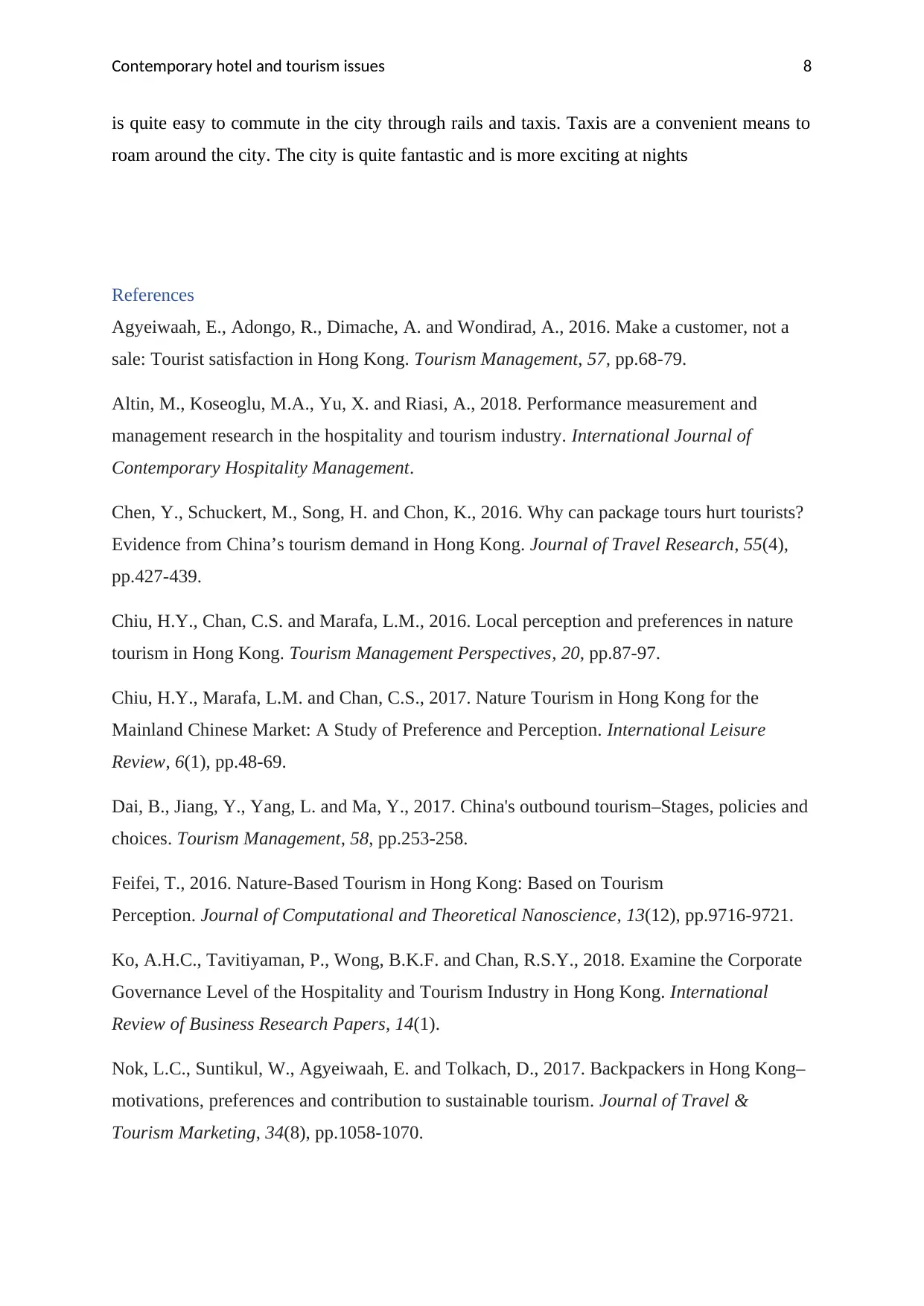
Contemporary hotel and tourism issues 8
is quite easy to commute in the city through rails and taxis. Taxis are a convenient means to
roam around the city. The city is quite fantastic and is more exciting at nights
References
Agyeiwaah, E., Adongo, R., Dimache, A. and Wondirad, A., 2016. Make a customer, not a
sale: Tourist satisfaction in Hong Kong. Tourism Management, 57, pp.68-79.
Altin, M., Koseoglu, M.A., Yu, X. and Riasi, A., 2018. Performance measurement and
management research in the hospitality and tourism industry. International Journal of
Contemporary Hospitality Management.
Chen, Y., Schuckert, M., Song, H. and Chon, K., 2016. Why can package tours hurt tourists?
Evidence from China’s tourism demand in Hong Kong. Journal of Travel Research, 55(4),
pp.427-439.
Chiu, H.Y., Chan, C.S. and Marafa, L.M., 2016. Local perception and preferences in nature
tourism in Hong Kong. Tourism Management Perspectives, 20, pp.87-97.
Chiu, H.Y., Marafa, L.M. and Chan, C.S., 2017. Nature Tourism in Hong Kong for the
Mainland Chinese Market: A Study of Preference and Perception. International Leisure
Review, 6(1), pp.48-69.
Dai, B., Jiang, Y., Yang, L. and Ma, Y., 2017. China's outbound tourism–Stages, policies and
choices. Tourism Management, 58, pp.253-258.
Feifei, T., 2016. Nature-Based Tourism in Hong Kong: Based on Tourism
Perception. Journal of Computational and Theoretical Nanoscience, 13(12), pp.9716-9721.
Ko, A.H.C., Tavitiyaman, P., Wong, B.K.F. and Chan, R.S.Y., 2018. Examine the Corporate
Governance Level of the Hospitality and Tourism Industry in Hong Kong. International
Review of Business Research Papers, 14(1).
Nok, L.C., Suntikul, W., Agyeiwaah, E. and Tolkach, D., 2017. Backpackers in Hong Kong–
motivations, preferences and contribution to sustainable tourism. Journal of Travel &
Tourism Marketing, 34(8), pp.1058-1070.
is quite easy to commute in the city through rails and taxis. Taxis are a convenient means to
roam around the city. The city is quite fantastic and is more exciting at nights
References
Agyeiwaah, E., Adongo, R., Dimache, A. and Wondirad, A., 2016. Make a customer, not a
sale: Tourist satisfaction in Hong Kong. Tourism Management, 57, pp.68-79.
Altin, M., Koseoglu, M.A., Yu, X. and Riasi, A., 2018. Performance measurement and
management research in the hospitality and tourism industry. International Journal of
Contemporary Hospitality Management.
Chen, Y., Schuckert, M., Song, H. and Chon, K., 2016. Why can package tours hurt tourists?
Evidence from China’s tourism demand in Hong Kong. Journal of Travel Research, 55(4),
pp.427-439.
Chiu, H.Y., Chan, C.S. and Marafa, L.M., 2016. Local perception and preferences in nature
tourism in Hong Kong. Tourism Management Perspectives, 20, pp.87-97.
Chiu, H.Y., Marafa, L.M. and Chan, C.S., 2017. Nature Tourism in Hong Kong for the
Mainland Chinese Market: A Study of Preference and Perception. International Leisure
Review, 6(1), pp.48-69.
Dai, B., Jiang, Y., Yang, L. and Ma, Y., 2017. China's outbound tourism–Stages, policies and
choices. Tourism Management, 58, pp.253-258.
Feifei, T., 2016. Nature-Based Tourism in Hong Kong: Based on Tourism
Perception. Journal of Computational and Theoretical Nanoscience, 13(12), pp.9716-9721.
Ko, A.H.C., Tavitiyaman, P., Wong, B.K.F. and Chan, R.S.Y., 2018. Examine the Corporate
Governance Level of the Hospitality and Tourism Industry in Hong Kong. International
Review of Business Research Papers, 14(1).
Nok, L.C., Suntikul, W., Agyeiwaah, E. and Tolkach, D., 2017. Backpackers in Hong Kong–
motivations, preferences and contribution to sustainable tourism. Journal of Travel &
Tourism Marketing, 34(8), pp.1058-1070.
⊘ This is a preview!⊘
Do you want full access?
Subscribe today to unlock all pages.

Trusted by 1+ million students worldwide
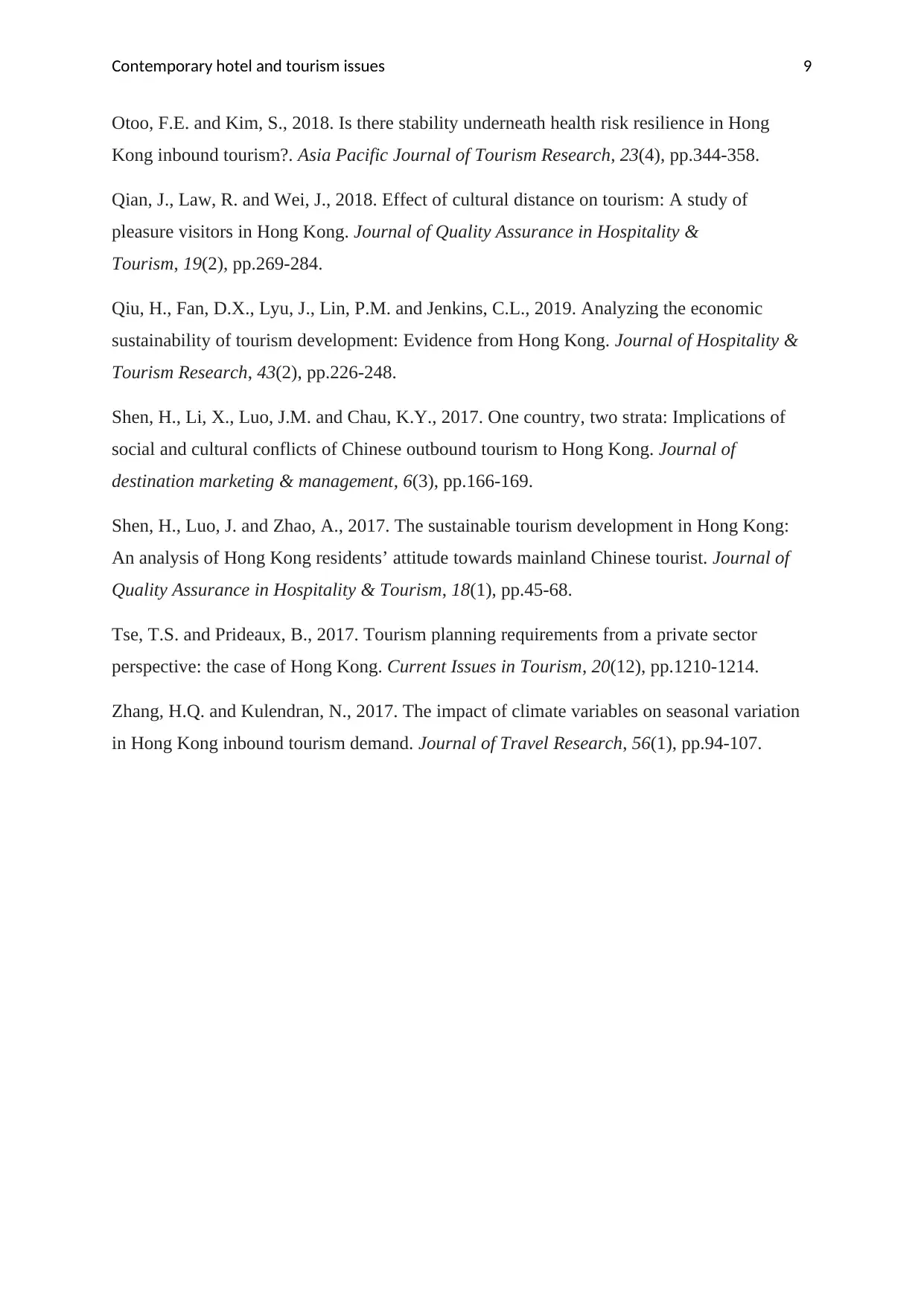
Contemporary hotel and tourism issues 9
Otoo, F.E. and Kim, S., 2018. Is there stability underneath health risk resilience in Hong
Kong inbound tourism?. Asia Pacific Journal of Tourism Research, 23(4), pp.344-358.
Qian, J., Law, R. and Wei, J., 2018. Effect of cultural distance on tourism: A study of
pleasure visitors in Hong Kong. Journal of Quality Assurance in Hospitality &
Tourism, 19(2), pp.269-284.
Qiu, H., Fan, D.X., Lyu, J., Lin, P.M. and Jenkins, C.L., 2019. Analyzing the economic
sustainability of tourism development: Evidence from Hong Kong. Journal of Hospitality &
Tourism Research, 43(2), pp.226-248.
Shen, H., Li, X., Luo, J.M. and Chau, K.Y., 2017. One country, two strata: Implications of
social and cultural conflicts of Chinese outbound tourism to Hong Kong. Journal of
destination marketing & management, 6(3), pp.166-169.
Shen, H., Luo, J. and Zhao, A., 2017. The sustainable tourism development in Hong Kong:
An analysis of Hong Kong residents’ attitude towards mainland Chinese tourist. Journal of
Quality Assurance in Hospitality & Tourism, 18(1), pp.45-68.
Tse, T.S. and Prideaux, B., 2017. Tourism planning requirements from a private sector
perspective: the case of Hong Kong. Current Issues in Tourism, 20(12), pp.1210-1214.
Zhang, H.Q. and Kulendran, N., 2017. The impact of climate variables on seasonal variation
in Hong Kong inbound tourism demand. Journal of Travel Research, 56(1), pp.94-107.
Otoo, F.E. and Kim, S., 2018. Is there stability underneath health risk resilience in Hong
Kong inbound tourism?. Asia Pacific Journal of Tourism Research, 23(4), pp.344-358.
Qian, J., Law, R. and Wei, J., 2018. Effect of cultural distance on tourism: A study of
pleasure visitors in Hong Kong. Journal of Quality Assurance in Hospitality &
Tourism, 19(2), pp.269-284.
Qiu, H., Fan, D.X., Lyu, J., Lin, P.M. and Jenkins, C.L., 2019. Analyzing the economic
sustainability of tourism development: Evidence from Hong Kong. Journal of Hospitality &
Tourism Research, 43(2), pp.226-248.
Shen, H., Li, X., Luo, J.M. and Chau, K.Y., 2017. One country, two strata: Implications of
social and cultural conflicts of Chinese outbound tourism to Hong Kong. Journal of
destination marketing & management, 6(3), pp.166-169.
Shen, H., Luo, J. and Zhao, A., 2017. The sustainable tourism development in Hong Kong:
An analysis of Hong Kong residents’ attitude towards mainland Chinese tourist. Journal of
Quality Assurance in Hospitality & Tourism, 18(1), pp.45-68.
Tse, T.S. and Prideaux, B., 2017. Tourism planning requirements from a private sector
perspective: the case of Hong Kong. Current Issues in Tourism, 20(12), pp.1210-1214.
Zhang, H.Q. and Kulendran, N., 2017. The impact of climate variables on seasonal variation
in Hong Kong inbound tourism demand. Journal of Travel Research, 56(1), pp.94-107.
1 out of 10
Related Documents
Your All-in-One AI-Powered Toolkit for Academic Success.
+13062052269
info@desklib.com
Available 24*7 on WhatsApp / Email
![[object Object]](/_next/static/media/star-bottom.7253800d.svg)
Unlock your academic potential
© 2024 | Zucol Services PVT LTD | All rights reserved.





